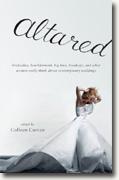Altared
Colleen Curran, ed.
book reviews:
· general fiction
· chick lit/romance
· sci-fi/fantasy
· graphic novels
· nonfiction
· audio books
· author interviews
· children's books @
curledupkids.com
· DVD reviews @
curledupdvd.com
newsletter
win books
buy online
links
home
for authors
& publishers
for reviewers

 |
Altared: Bridezillas, Bewilderment, Big Love, Breakups, and What Women Really Think About Contemporary Weddings Colleen Curran, ed. Vintage Paperback 384 pages May 2007 |
|
When my fiancé proposed, I did not cry and leap into his arms exclaiming “Yes!” Instead, I locked myself in the bathroom and had a panic attack. I had watched friends plan weddings; I’d seen the show “Bridezilla.” It was the wedding that scared the pants off me, not the commitment. I eventually came out, and I eventually said yes. The congratulations abounded as we spread the news, but it was when I got the first “What are your colors?” conversation that my panic resumed.
Beyond the frivolous and gaudy detail that weddings entail, any self-respecting woman (proclaimed feminist or no) will have issues with some of the rituals of nuptials — the white dress, the veil, the giving away, never mind the garter that your fiancé’s friend is supposed to pull off with his teeth. Writer Catherine Ingrassia in “Diana, Martha, and Me” gives the background of such rituals. The white dress originated with the wedding of Queen Victoria in 1840 and has stayed in vogue ever since. Instead of representing purity, Ingrassia holds that the white dress was a class indicator, since only the rich could afford to clean the color that showed the most dirt. And that pesky veil? Ingrassia reports that it was used in Roman times to keep away evil spirits. As I wear my mother’s lace, mantilla-styled veil, I’ll think of its magical powers and not the fact that I look alarmingly like the Virgin Mary. Unlike the ad-heavy bride magazines and quasi-helpful web sites like The Knot, Altared What’s more, this book catalogs aspects of weddings that go unsaid and unnoticed. Elise Mac Adam in “Manners and the Marrying Girl” admits to using the steadfast rules of wedding etiquette as a scapegoat when overwhelmed by the myriad of choices and opinions she had to negotiate. In “The Honor of My Presence,” Meghan Daum reminds narrowly focused brides what it’s like to be the single friend at the wedding. Weddings can cause the most empathetic amongst us to go selfish. Jill Eisenstadt pinpoints the awkwardness of the night in “To Have or Have Not: Sex on the Wedding Night.” She describes the ceremony and reception as one big public spectacle of forced flirtation between new wife and husband as they’re asked to mush cake in each other’s mouth, slow dance alone and kiss whenever a spoon hits crystal. Eisenstadt is outraged that the irony is never acknowledged; very few couples end up consummating their union on their wedding night. The ultimate value in Altared Yet, this is an anthology of and for very specific would-be brides. All the contributors are writers, the kind of women who used to read Sassy magazine, and who all lived in NYC at some point in their lives. Many writers note the influence of Princess Di’s wedding on their youths, and oddly, many speak of their perfect male as resembling David Duchovny. Their tone often slides into apology as they bemoan the wedding process while asserting that they love their husbands and fiancés deeply. But where is the frustration that –as in childbirth – all the labor of the wedding falls on the woman’s shoulders? In my search for a wedding dress, another saleswoman with cold hands had just ordered me to strip and then stuffed me into another gown. I came out to stand on the pedestal as the girl in the next room did the same. My mother, friends and saleswoman scanned the fit and yanked at the fabric to mimic the correct size. The would-be bride next to me met my eyes for a quick moment. I wanted to ask her how she was doing, how she found managing it all, if she thought her street cred was still intact. I felt awkward and sweaty under the hot lights and attention while she appeared serene, or perhaps a little sleepy. I never talked to her, but I wish I had. After reading Altared Originally published on Curled Up With A Good Book at www.curledup.com. © Amanda McCorquodale, 2007 |
|
|
|
 Click here to learn more about this month's sponsor! |
|
| fiction · sf/f · comic books · nonfiction · audio newsletter · free book contest · buy books online review index · links · · authors & publishers reviewers |
|
| site by ELBO Computing Resources, Inc. | |
